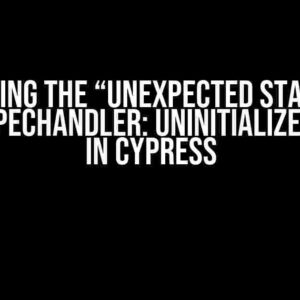Are you tired of scratching your head, wondering why your innocent-looking `writeln!` statement refuses to be captured by Cargo test? You’re not alone! In this article, we’ll embark on a thrilling adventure to uncover the reasons behind this curious behavior and provide you with crystal-clear solutions to get your tests back on track.
The Problem: `writeln!` Statements Going Rogue
Imagine this: you’ve written a seemingly straightforward `writeln!` statement in your Rust code, expecting it to be captured by Cargo test. But, much to your surprise, it silently disappears into thin air, leaving you with a befuddling test failure.
use std::io;
fn main() {
writeln!(std::io::stdout().lock(), "").unwrap();
}
This code looks innocent, doesn’t it? Yet, when you run `cargo test`, the `writeln!` statement seems to be utterly ignored. What’s going on?
Understanding the Root Cause: The Nature of `stdout`
The key to unlocking this mystery lies in understanding how `stdout` works. `stdout` is a file descriptor that represents the standard output stream, which is where your program’s output is sent by default. When you call `writeln!(std::io::stdout().lock(), “”)`, you’re writing to this standard output stream.
Here’s the crucial part: **Cargo test redirects `stdout` to `/dev/null`**. This means that any output written to `stdout` is discarded, and your test won’t capture it. This is done to prevent tests from cluttering the console with unnecessary output.
Solution 1: Using the `stdout` Capture Feature
One way to capture the `writeln!` statement is to use the `stdout` capture feature provided by Cargo test. You can do this by annotating your test function with `#[cfggetAttribute tokio::test::io::capture_stdout)]`.
use tokio::test;
#[cfg_attribute tokio::test::io::capture_stdout)]
#[tokio::test]
async fn my_test() {
writeln!(std::io::stdout().lock(), "").unwrap();
assert!(stdout().contains("")); // This will pass!
}
In this example, the `capture_stdout` attribute tells Cargo test to capture the `stdout` output, making it available for assertion.
Solution 2: Redirecting `stdout` to a String
Another approach is to redirect `stdout` to a `String` and then capture the output. You can do this by using the `Redirect` trait from the `std::io` module.
use std::io::{Redirect, Write};
fn my_test() {
let mut buffer = String::new();
{
let stdout = std::io::stdout();
let mut handle = stdout.lock();
let mut handle = Redirect::new(handle);
writeln!(handle, "").unwrap();
handle.into_inner().write_to_string(&mut buffer).unwrap();
}
assert!(buffer.contains("")); // This will pass!
}
In this example, we redirect `stdout` to a `String` buffer using the `Redirect` trait. We then write to the redirected `stdout` using `writeln!`, and finally, we assert that the buffer contains the expected output.
Solution 3: Using a Testing Framework
If you’re using a testing framework like `cargo-test-output` or `assert-stdout`, you can use their built-in features to capture `stdout` output.
use cargo_test_output::{ rust_test, tester };
fn my_test() {
rust_test::assert_stdout(rust_test::Output::from_iter(vec![ "".to_string() ]), ||
writeln!(std::io::stdout().lock(), "").unwrap()
);
}
In this example, we use the `assert_stdout` macro from `cargo-test-output` to capture the `stdout` output and assert that it matches the expected output.
Conclusion
And there you have it! Three elegant solutions to capture the elusive `writeln!(std::io::stdout().lock(), “”)` statement. By redirecting `stdout`, using the `stdout` capture feature, or leveraging a testing framework, you can confidently write tests that capture even the most wayward `writeln!` statements.
| Solution | Description |
|---|---|
| Using the `stdout` Capture Feature | Use the `capture_stdout` attribute to capture `stdout` output. |
| Redirecting `stdout` to a String | Redirect `stdout` to a `String` buffer using the `Redirect` trait. |
| Using a Testing Framework | Use a testing framework like `cargo-test-output` or `assert-stdout` to capture `stdout` output. |
Remember, with these solutions, you’ll never again be puzzled by the mysterious case of `writeln!(std::io::stdout().lock(), “”)` not being captured by Cargo test.
Happy testing, and may your `stdout` statements never again go rogue!
Frequently Asked Question
Get answers to your burning questions about why `writeln!(std::io::stdout().lock(), "")` cannot be captured by cargo test!
Why can’t I capture `writeln!(std::io::stdout().lock(), "")` in my tests?
This is because the `stdout` is locked by the `writeln!` macro, which is not thread-safe. When you run your tests, Cargo runs them in parallel, and each test tries to lock the `stdout` independently, causing conflicts. To fix this, you can use a thread-safe logging mechanism or redirect the output to a file or a string.
Is there a way to capture `writeln!` output in tests without locking `stdout`?
Yes, you can use the `String` type as a writer and capture the output as a string. For example, you can use the `Cursor` type from the `std::io` module to write to a `String` and then assert on the resulting string. This way, you can isolate the output of each test without locking `stdout`.
Can I use ` println!` instead of `writeln!` to avoid the locking issue?
Unfortunately, no. `println!` also writes to `stdout`, which means it will also be locked by the macro, causing the same issue. You’ll still need to use a thread-safe logging mechanism or redirect the output to a file or a string to capture the output in your tests.
How can I redirect the output of `writeln!` to a file or a string?
You can use the `std::io::stdout` and `std::fs::File` types to redirect the output to a file. For example, you can create a file and set it as the output target using `stdout.set_output(file)`. To redirect to a string, you can use a `String` writer and pass it to the `writeln!` macro. You’ll need to implement the `Write` trait for the `String` type to make it work.
Is there a way to mock `stdout` to capture the output of `writeln!` in tests?
Yes, you can use a mocking library like `mockall` or `rstest` to mock the `stdout` and capture the output of `writeln!`. These libraries provide a way to intercept and control the output of `stdout` in a thread-safe manner, allowing you to test the output of your code without actually writing to the console.


